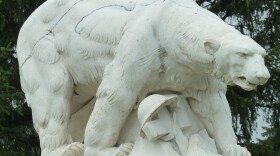Author James Carl Nelson says as World War I was winding down on November 11, 1918, fighting in northern Russia was getting more intense. He says it was frustrating for American troops who wondered what their mission was.
Nelson’s book is called The Polar Bear Expedition: The Heroes of America’s Forgotten Invasion of Russia, 1918-1919. He tells the story of men, most of them from Michigan and Wisconsin, and their strange trip from what was then called Camp Custer near Battle Creek to Russia, 600 miles north of Moscow for a mission that went beyond the end of World War I. Note: This interview was originally presented in February.
Even before the soldiers arrived in northern Russia, the flu was taking its toll. Nelson says transports were ridden with Spanish flu, and men started getting sick and some died along the way. Nelson says it was a bad omen for what was going to happen later.
Nelson says the soldiers fought heroically, but did not know what they were fighting for. He says there were a few instances of dissension, and he says it affected morale. Although one incident was referred to as mutiny, Nelson calls that an exaggeration.
After the war, an effort was made to bring back the bodies of those who had died and been buried in Russia. Nelson says it gnawed at the soldiers that the men they fought with were left behind. Many of those brought back are buried near the Polar Bear Monument in Troy.




